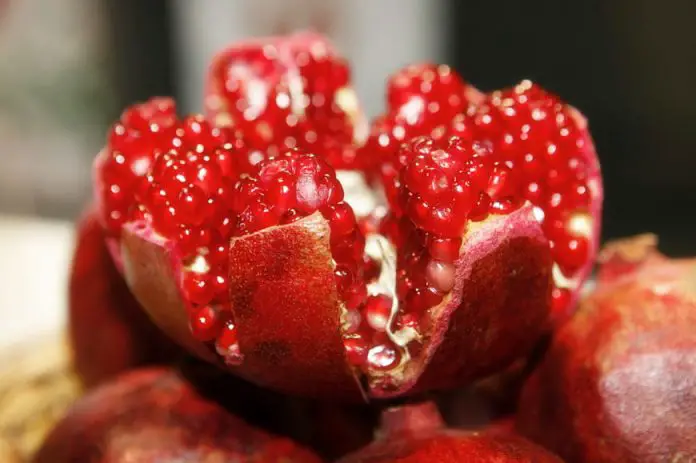Pomegranates are bursting with flavor and nutrients, and are mostly sweet and slightly sour with hints of cherry and cranberry. If your fur baby enjoys exploring with his taste buds, he will find this fruit refreshing.
Pomegranates are not just amazingly delicious. They are actually considered to be a superfood because they are loaded with vitamins and minerals that are beneficial for you and your pup. Several studies claimed this fruit could even ward off cancer. Nonetheless, it is important to know whether pomegranates are actually safe for dogs or not. Is it safe to share some with your pet?
Can Dogs Have Pomegranates?
There are opposing statements with regards to giving pomegranates to dogs. Dr. Patrick Mahaney, a certified veterinary acupuncturist, wrote that pomegranates are among the healthiest fruits for them.
Looking at their health benefits, pomegranates did not fail to impress us. They boast a lot of antioxidants and vitamin C, not to mention that they are also rich in dietary fiber. For us humans, consuming pomegranates is known to protect against certain cancers and Alzheimer’s.
Dr. Mahaney said pomegranates can be served to dogs by removing the seeds and crushing them in your pet’s bowl or mixing them in the dog’s food. The seeds, also known as the arils, are actually the edible part of pomegranates. Albedo, the white substance, can also be eaten, but it has a bitter taste so your dog might just spit it out. If your pet accidentally ate the peel, expect an upset stomach.
It is worth noting that pomegranates are still a “no-no” for many dog owners. Though not deadly like other fruits such as grapes and raisins, there were so many instances when they got sick because they ate pomegranates. Some of dog owners said pomegranates should not be given to dogs.
While the pure pomegranate fruit can make your dog sick, there is still a way to incorporate this fruit into dog’s diet – in their treats! These days, there are so many dog treats containing pomegranate. There is a dog-friendly frozen pomegranate bar and blueberry and pomegranate dog biscuits on the market.
Can Dogs Drink Pomegranate Juice?
Dr. Mahaney emphasized the fact that pomegranate juice is abundant in certain ellagitannin compounds. This is the reason why it has more antioxidants than green tea and red wine. While it can be incredibly healthy for you, this naturally occurring substance may harm your dog.
Given that, dogs should not drink pomegranate juice at any cost. If you want to give them a refreshing drink other than water, you may consider coconut water from young coconut meat. In moderate amounts, this one is healthier and would not upset their stomach.
Risks of Feeding Canines Pomegranates
Some of vets agreed that pomegranates may be given to doggies, but they do not recommend it. The reason why they are strongly against it is that the fruit has tannins that are believed to cause stomach problems in canines.
The hydrolyzable tannins can be found on the arils and the peel. Tannins are naturally occurring polyphenols from plants, seeds, and fruit peels. Did you know that tannins are present in many fruits? Berries, which dogs love, also contain certain amounts of them. Take note that all the toxic foods for dogs, including chocolates, grapes, and red wine, have a high amount of tannins.
What to Do If Your Dog Ate Pomegranate?
Pomegranate is not as dangerous as grapes or raisins, although they all contain tannins. However, it can still cause your dog to have an upset stomach, especially if it’s the first time he ate it.
Symptoms to keep an eye out for are:
- Vomiting
- Diarrhea
- Lethargy
Some dogs do not show any signs of illness, but in most cases, doggies get really ill after consuming the fruit. The chance of your dog getting sick depends on the number of pomegranate seeds he ingested. If he ate more than 20 seeds, expect to see the symptoms listed above.
Excessive consumption of pomegranate can cause abdominal pain and diarrhea both in humans and in animals. The good news is that these symptoms normally subside after a few hours, so there is really nothing to worry about it. These symptoms are not fatal.
Vomiting is a sign that something is going on inside your dog’s body. But just like with us humans, it can be a good thing because it is the body’s way to get rid of unwanted toxins. This is likely to happen especially if your dog has a sensitive stomach.
You may consider bringing your dog to his vet if he consumed quite a lot of the fruit or if he has been vomiting for more than 48 hours. It is better to consult an expert if your dog has been suffering from a bad case of diarrhea even after you gave him an OTC medication. If you cannot take him to a vet immediately, call your pet doctor to see whether you can induce vomiting at home.
When you are pretty sure your dog has eaten quite a large quantity of pomegranate but has not vomited, induced vomiting can be safely done if your vet gives you the go ahead. You can administer a 3% hydrogen peroxide solution once and repeat it only once if you see no effects. The dosage is one teaspoon for every 10 pounds of your pet’s body weight.
If your dog accidentally ate the pomegranate peels, never try to do induce vomiting. There is a high risk of aspiration or inflammation of the lungs after inhaling a foreign matter. Supposing you are unsure about what to do, it is best to immediately take your pet to his vet.
Alternatives to Pomegranates
When you are eager to feed your dog some fruits, consider the fact that there are so many options out there that are totally safe. These fruits are among the best ones you can give your puppy, without worrying he might get an upset stomach afterward:
Blueberries – they are not just the best for cheesecakes. The fruit is delicious on its own and most dogs enjoy eating it. This berry boasts decent amounts of fiber, vitamin C, and potassium. On top of that, blueberries are also good for the heart.
Watermelon – a popular summer fruit, watermelon is a good treat for dogs after a long walk or during those scorching hot days. This fruit, which consists of 92% water, is loaded with vitamins A and C as well as antioxidants.
Apples – as the old adage goes, an apple a day keeps the doctor away. The same is true for dogs. You may add it to dog’s regular diet because apple is nutrient-dense and has so many health benefits, including fighting cancer, preventing inflammation, and improving the digestive health.
Bananas – the vitamin B6 in bananas can help your fur baby sleep better. They are also rich in magnesium that can help in developing his muscles. Bananas have low cholesterol and sodium contents.
Mangoes – the antioxidants found in mango is said to protect against various types of cancers. Aside from being a cancer-fighting fruit, mangoes are the best picks for lowering cholesterol and improving digestion.
Nectarines – they look a lot like apples, but they are two different things with different nutritional contents. Nectarines actually have more vitamins and minerals than apples. They also contain less sugar, sodium, and saturated fat.
Plums – when your dog has a sweet tooth, he will enjoy the taste of plums. This fruit is rich in antioxidants that can fight many types of diseases including cancer, diabetes, and macular degeneration.
Peaches – with their juiciness and sweetness, it is quite hard to ignore peaches. But there is more to peaches than their tasty flavor. They boast quite a lot of minerals, such as magnesium, iron, and manganese.
Raspberries – they are incredibly delicious and your dog will find them hard to resist. Raspberry is an excellent source of fiber, vitamins, and antioxidants.
Pineapple – this fruit not only aids in digestion. There is more to love with pineapples, including their ability to strengthen the bones and support the immune system.
Some fruits such as mangoes, nectarines, and apples have pits. Better remove them first before feeding the fruits to your dog because the pit can cause intestinal obstruction in canines. Some pits can also be poisonous.
The key to a successful feeding is offering everything in moderation, including fruits. Make sure your dog has balanced diet consisting of not just of fruits but also of vegetables and meats.
Conclusion
Pomegranate is not toxic for dogs, but it can still make him sick due to the content of tannins. A canine’s stomach cannot handle the antioxidants found in these fruits. The concentrated or pure forms of pomegranate are quite hard to digest for canines. Even for humans, too much of this fruit can lead to stomach problems.
If you are worried it may harm your dog, better not give it to him at all. In case he accidentally consumed some seeds, keep an eye for warning signs such as vomiting, diarrhea, and lethargy. Consult your vet if the dog has not returned to his usual state after a couple of days.























